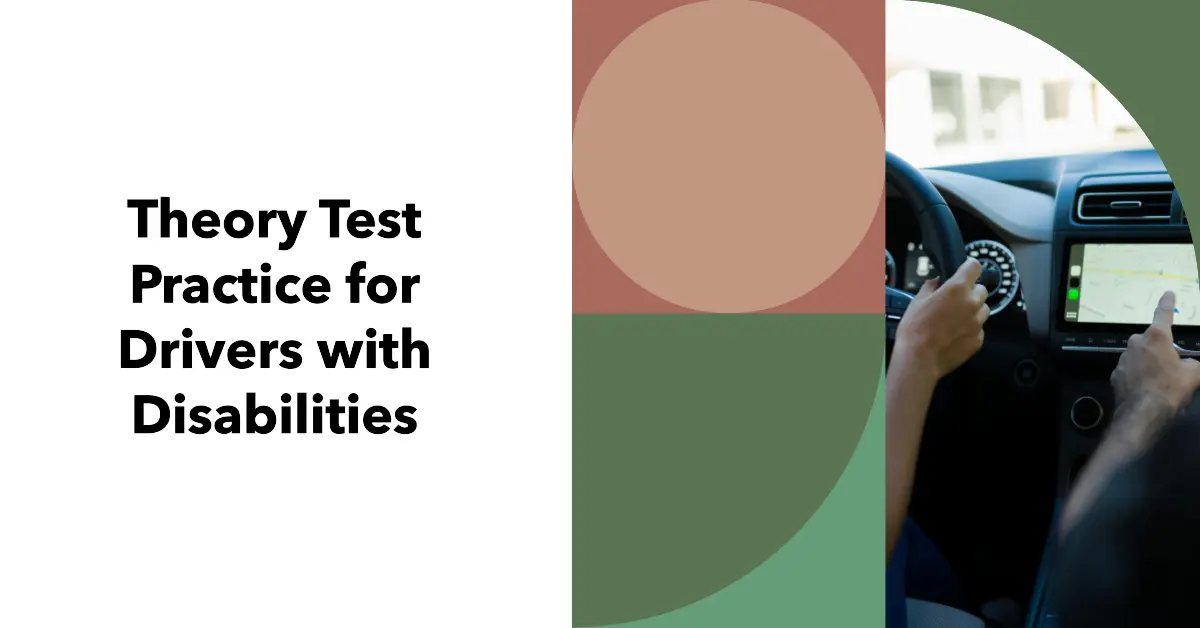Introduction
Becoming a licensed driver is a significant achievement, providing individuals with newfound independence and opportunities for mobility. However, for drivers with disabilities, the journey towards obtaining a driver’s license often presents unique challenges. The theory test, designed to assess knowledge of road rules and safety, is a crucial step in this process. In this comprehensive guide, we will explore theory test practice for drivers with disabilities, offering valuable insights and strategies to help overcome challenges and achieve success.
Understanding the Significance of the Theory Test
Equal Opportunities for All Drivers
The theory test is a critical component of ensuring that all drivers, regardless of their abilities, have the knowledge required to navigate the roads safely. It promotes equal opportunities for individuals with disabilities to obtain a driver’s license.
Identifying Challenges and Barriers
Accessibility Concerns
One of the primary challenges drivers with disabilities face during theory test practice is accessibility. Test centers and study materials may not always be designed with the specific needs of disabled individuals in mind.
Cognitive and Learning Disabilities
Drivers with cognitive or learning disabilities may experience difficulties with reading comprehension, memory retention, or processing information quickly—areas that are essential for success in the theory test.
Physical Disabilities
Physical disabilities may limit an individual’s ability to access study materials or use traditional input devices during practice tests. These limitations can impact the overall study experience.
Tailoring Theory Test Practice for Drivers with Disabilities
Access to Accessible Materials
Seek out accessible study materials, such as digital versions of the driver’s handbook with screen reader compatibility. These materials can be read aloud or customized to suit individual needs.
Adjusting Study Methods
Recognize that everyone learns differently. Experiment with various study methods, such as audio-based learning, interactive apps, or hands-on activities that cater to your strengths.
Online Resources for Theory Test Practice
Explore Assistive Technologies
Many online theory test practice platforms offer accessibility features, such as adjustable font sizes, color contrasts, and voice-activated interfaces. These tools can enhance the learning experience for drivers with disabilities.
Practice with Mock Tests
Utilize online mock tests specifically designed for drivers with disabilities. These tests often feature questions that reflect a range of abilities and scenarios, allowing for tailored practice.
Customizing the Learning Experience
Use Adaptive Tools
Adaptive tools, such as speech-to-text software or voice-activated assistants, can be invaluable for drivers with physical disabilities. These tools can help input answers and navigate study materials effectively.
Personalized Study Plans
Develop a personalized study plan that accommodates your specific needs and abilities. Prioritize areas where you need more practice and allow extra time for comprehension and retention.
Practical Preparation for Test Day
Request Accommodations
Contact the test center well in advance to request any necessary accommodations for test day. This may include extended time, alternative test formats, or accessible facilities.
Familiarize Yourself with the Testing Environment
Visit the test center before your scheduled exam to become familiar with the layout and ensure that it is accessible. This can help reduce anxiety on test day.
Overcoming Test Anxiety
Mindfulness and Relaxation Techniques
Learn and practice relaxation techniques, such as deep breathing or mindfulness meditation, to manage test anxiety. Stress can affect performance, and these techniques can help calm nerves.
Support and Guidance
Seek Support from Disability Organizations
Connect with disability advocacy groups or organizations that can provide guidance, resources, and peer support for drivers with disabilities navigating the theory test.
Embracing Technology and Assistance
Assistive Technology
Explore the world of assistive technology, which offers a wide range of tools designed to assist individuals with disabilities. Speech recognition software, screen readers, and adaptive keyboards are just a few examples of assistive devices that can aid in theory test practice.
Voice-Activated Assistants
Voice-activated assistants like Siri, Google Assistant, or Amazon Alexa can help you find answers to questions, read study materials aloud, and set reminders for your study sessions. These assistants can be particularly useful for drivers with physical disabilities.
Peer Support and Communities
Join Supportive Communities
Seek out online forums, social media groups, or local organizations dedicated to drivers with disabilities. These communities can provide valuable insights, share experiences, and offer emotional support throughout your journey.
Advocating for Accessibility
Advocate for Inclusivity
If you encounter accessibility issues while preparing for your theory test, don’t hesitate to advocate for change. Contact relevant authorities or organizations to raise awareness about the importance of accessibility for drivers with disabilities.
Reasonable Accommodations on Test Day
Understanding Accommodations
Familiarize yourself with the accommodations available to you on test day. Understand your rights and the options offered by the testing center to ensure a fair and accessible testing environment.
Stay Positive and Resilient
The path to obtaining a driver’s license may have its challenges, but maintaining a positive and resilient mindset is crucial. Remember that your determination and commitment can lead to success.
Conclusion
Passing the theory test as a driver with disabilities is a testament to your determination, adaptability, and the strength of your will. It represents an important step towards achieving independence, mobility, and the freedom to explore the world on your terms. By embracing technology, seeking support, and advocating for inclusivity, you can overcome the unique challenges that you may encounter during theory test practice. Remember that your journey as a driver is not limited by your disability; it is defined by your perseverance and the countless possibilities that lie ahead. With the right strategies and support, you are well on your way to becoming a safe and responsible driver, and your accomplishments will inspire others to follow in your path. Good luck on your theory test, and may the road ahead be filled with empowerment, achievement, and endless adventures.






